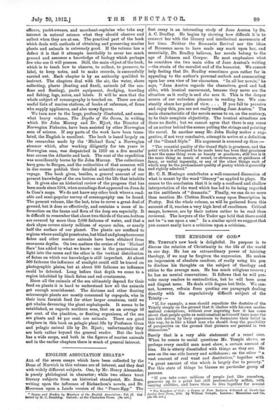ENGLISH ASSOCIATION ESSAYS.*
ALL of the seven essays which have been collected by the Dean of Norwich in this volume are of interest, and they deal with widely different subjects. One, by Mr. Henry Alexander, is purely philological in character; while two others treat literary subjects from an historical standpoint, Mr. Boas, writing upon the influence of Richardson's novels, and Dr. Moorman upon a Leeds version of the "Peace-Egg." The • Essays and Studies by Meiabers of the English Association: Yal.11. Col- lected by If. C. Beeohtug. Oxford : at the Clarendon Press. Os. net.]
first essay is an interesting study of Jane Austen by Dr. A. C. Bradley. He begins by showing how difficult it is to connect her with the literary and intellectual movements of her time. Neither the Romantic Revival nor the ideas of Rousseau seem to have made any mark upon her, and essentially, Dr. Bradley believes, her novels belong to the age of Johnson and Cowper. He next emphasizes what he considers the two main sides of Jane Austen's writing —the strain of the moralist and of the humorist. We cannot
help feeling that Dr. Bradley sometimes goes rather far in appealing to the author's personal outlook and commenting upon her own view of her characters. "In all her novels," he says, "Jane Austen regards the characters, good and bad alike, with ironical amusement, because they never see the
situation as it really is and she sees it. This is the deeper source of our unbroken pleasure in reading her. We con- stantly share her point of view. . . . If you fail to perceive and enjoy this, you are not really reading Jane Austen." The main characteristic of the novels seems to us, on the contrary, to be their complete objectivity. The ironical situations are there no doubt; but we cannot agree that there is any sense of an author behind the scenes pulling the strings and pointing the moral. In another essay Mr. John Bailey makes a sug., gestive, if not very conclusive, attempt to arrive at a definition of the "Grand Style." His argument is summed up thus :—
"The essential quality of the Grand Style is greatness, and the point which is attempted to be made here has been that greatnesti is not the same thing even as beauty or goodness; still less is it the same thing as music of sound, or cleverness, or quickness of fancy, or verbal ingenuity, or any of the other things each of which may be the predominant quality of poetry which is generally and rightly admired."
Mr. C. E. Montagu contributes a well-reasoned discussion of what is meant by the word "literal)," as applied to plays. He
comes to the conclusion that it is only a confused and shallow interpretation of the word which has led to its being regarded as the antithesis of "dramatic." Finally, we can do no more than mention Mr. Clutton Brook's essay upon Description in Poetry. But the whole volume, as will be gathered from this account of it, reaches a very high level of excellence. Critical essays, however, are by their nature rather to be read than reviewed. The lawyers of the Tudor age held that there could not be "a use upon a use." In a similar spirit we suggest that you cannot easily have a criticism upon a criticism.






































 Previous page
Previous page